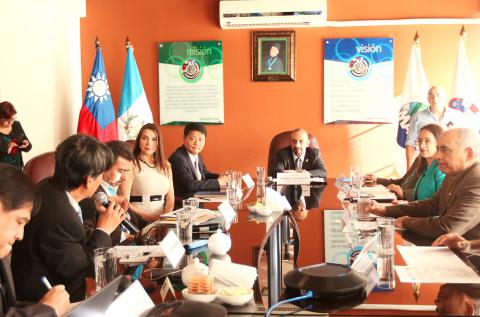With its five decades of experience, Taiwan is helping Central and South American countries fight fusarium wilt in bananas, and was involved in a video conference earlier this month attended by nearly 500 experts from 28 nations, the International Cooperation and Development Fund (ICDF) said yesterday.
The banana trade is vital to the economies of Central and South American countries, and the disease poses a great threat to their banana production, ICDF Deputy Secretary-General Alex Shyy (史立軍) told a news briefing at the Ministry of Foreign Affairs in Taipei.
The fungal disease, which devastates plants’ vascular systems, could be described as the “cancer” of bananas and spores can survive in soil for decades, a report by the Taiwan Banana Research Institute said.

Photo courtesy of the International Cooperation and Development Fund
Taiwan first identified the disease in bananas in Pingtung County in 1967, the institute said, adding that it destroyed nearly 4,000 hectares of banana trees in Pingtung and Kaohsiung in a few years, dealing a severe blow to the nation’s banana exports.
The disease was linked to soil degradation caused by the use of chemical fertilizers, the report said.
After Colombia last year reported its first case of the disease, Central America’s International Regional Organization for Plant and Animal Health (OIRSA) asked to work with the ICDF again, after the two fought citrus greening disease together, Shyy said.
Taiwan has an edge in fighting fusarium wilt because of certain disease-resistant banana strains developed by the institute, as well as research and testing techniques developed by National Taiwan University (NTU), he said.
Institute director Chao Chih-Ping (趙治平), NTU plant pathology professor Hung Ting-hsuan (洪挺軒) and OIRSA members joined the ICDF on a trip to inspect banana farms in Guatemala, Belize and Honduras from Feb. 2 to Feb. 14, Shyy said.
A video conference at OIRSA’s office in Guatemala on Feb. 5 also attracted more than 500 experts from 28 nations, including Colombia and Ecuador, as well as Caribbean countries, he said.
When it comes to sustainable banana production, the nation can proudly say: “Taiwan can help,” Shyy added.
In related news, the agency is helping the Marshall Islands employ hydroponics to improve its self-sufficiency with regard to food, despite having infertile soil and inclement weather conditions, Shyy said.

Intelligence agents have recorded 510,000 instances of “controversial information” being spread online by the Chinese Communist Party (CCP) so far this year, the National Security Bureau (NSB) said in a report yesterday, as it warned of artificial intelligence (AI) being employed to generate destabilizing misinformation. The bureau submitted a written report to the Legislative Yuan in preparation for National Security Bureau Director-General Tsai Ming-yen’s (蔡明彥) appearance before the Foreign Affairs and National Defense Committee today. The CCP has been using cognitive warfare to divide Taiwanese society by commenting on controversial issues such as Taiwan Semiconductor Manufacturing Co’s (TSMC, 台積電) investments in the

HELPING HAND: The steering committee of the National Stabilization Fund is expected to hold a meeting to discuss how and when to utilize the fund to help buffer the sell-off The TAIEX plunged 2,065.87 points, or 9.7 percent, to close at 19,232.35 yesterday, the highest single-day percentage loss on record, as investors braced for US President Donald Trump’s tariffs after an extended holiday weekend. Amid the pessimistic atmosphere, 945 listed companies led by large-cap stocks — including Taiwan Semiconductor Manufacturing Co (TSMC, 台積電), Hon Hai Precision Industry Co (鴻海精密) and Largan Precision Co (大立光) — fell by the daily maximum of 10 percent at the close, Taiwan Stock Exchange data showed. The number of listed companies ending limit-down set a new record, the exchange said. The TAIEX plunged by daily maxiumu in just

‘COMPREHENSIVE PLAN’: Lin Chia-lung said that the government was ready to talk about a variety of issues, including investment in and purchases from the US The National Stabilization Fund (NSF) yesterday announced that it would step in to staunch stock market losses for the ninth time in the nation’s history. An NSF board meeting, originally scheduled for Monday next week, was moved to yesterday after stocks plummeted in the wake of US President Donald Trump’s announcement of 32 percent tariffs on Taiwan on Wednesday last week. Board members voted to support the stock market with the NT$500 billion (US$15.15 billion) fund, with injections of funds to begin as soon as today. The NSF in 2000 injected NT$120 billion to stabilize stocks, the most ever. The lowest amount it

INVESTIGATION: The case is the latest instance of a DPP figure being implicated in an espionage network accused of allegedly leaking information to Chinese intelligence Democratic Progressive Party (DPP) member Ho Jen-chieh (何仁傑) was detained and held incommunicado yesterday on suspicion of spying for China during his tenure as assistant to then-minister of foreign affairs Joseph Wu (吳釗燮). The Taipei District Prosecutors’ Office said Ho was implicated during its investigation into alleged spying activities by former Presidential Office consultant Wu Shang-yu (吳尚雨). Prosecutors said there is reason to believe Ho breached the National Security Act (國家安全法) by leaking classified Ministry of Foreign Affairs information to Chinese intelligence. Following interrogation, prosecutors petitioned the Taipei District Court to detain Ho, citing concerns over potential collusion or tampering of evidence. The